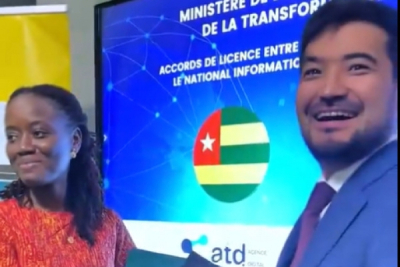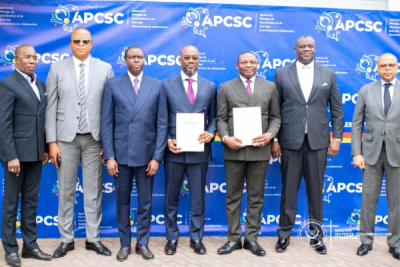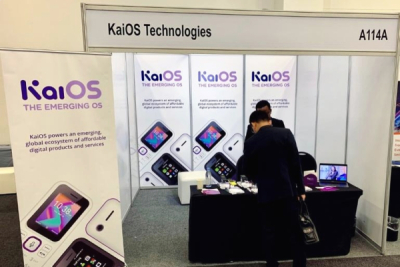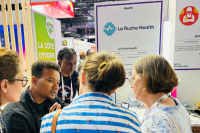She enables Algerians to sell and buy fairly used fashion clothing and accessories online. For her solution, she has received several awards and recognitions.
Amina Djebbar is an Algerian entrepreneur and a graduate of the University of Algiers, where she earned a degree in Arabic-French-English translation in 2006. She is the founder of Vandista, an online second-hand fashion marketplace.
Launched in 2020, Vandista allows users to buy and sell second-hand fashion clothing and accessories. It offers fast and secure delivery through delivery partners and pickup points. Payments can be made by credit card, upon delivery, or using the balance from sales.
For every order, Vandista provides protection that allows for returns in case of defects or non-compliance. The startup has over 72 pickup points and offers more than 15,000 items for sale.
Before launching Vandista, Amina Djebbar founded Evens Factory Algérie in 2018, a company specializing in professional event management. Four years later, she created Women's Business Agency, another event management agency specializing in teambuilding events, renting and creating customized booths, and designing games and activities for trade shows and exhibitions.
After her studies, she worked as a commercial attaché at CFAO in Algeria starting in 2007, a company operating in the sectors of mobility, health, consumer goods, infrastructure, and energy in Africa. In 2009, she joined Emploitic.com, a recruitment platform, as a key account manager.
In 2017, she became responsible for talent acquisition and HR projects at Société Générale de Surveillance (SGS). Between 2021 and 2022, she worked as the marketing and sales director at the Center for Psychological Research and Application (CRAP).
Amina Djebbar has received several awards and distinctions. In 2023, her platform Vandista won the best mobile application award at the CTO Forum Algeria. She received the special Ooredoo prize as part of the national MACHROU3I competition dedicated to women entrepreneurs. In 2024, she won the first prize in the third edition of the Annual Women's Entrepreneur Challenge organized by the public startup accelerator Algeria Venture.
Melchior Koba
The initiative aims to facilitate investments from members of the Cameroonian diaspora in their hometown and encourage economic contributions from Cameroonians living abroad, fostering development and growth in Douala
The Urban Community of Douala (CUD), the Douala's municipal government, unveiled its digital platform, icud-diaspora, on Wednesday, June 26, following the establishment of a framework for exchanges with the diaspora in December 2022. This initiative aims to encourage Cameroonians living abroad to invest in the country's economic capital.
"We took the time to analyze key insights, such as the unanimously expressed demand from our diaspora to establish digital bridges to better harness opportunities in Cameroon. Through this platform, we want to offer skills, networks, and relationships that will enable our diaspora to invest in Douala and help us meet the city's social demands," explained Douala's mayor, Roger Mbassa Ndine.
The icud-diaspora platform allows Cameroonian migrants to declare their projects for Douala with just a few clicks and propose their expertise. In return, the city government promises to offer public-private partnerships (PPP), a dedicated remote contact person, project assistance, online services, a network of approved providers, and land availability.
According to a diaspora consultation conducted by the CUD between June and August 2023, 72% of the 445 respondents are willing to invest if conditions are met, 49% desire a dedicated intermediary to facilitate their projects, and 81% prioritize the quality and reliability of information. The consultation identified main barriers to diaspora engagement, including economic, social, and political conditions, bureaucracy, lack of incentives, and a deficit of trust and knowledge about opportunities.
Currently, the CUD offers a dozen opportunities to the diaspora in infrastructure and urban planning, such as developing residential or commercial real estate projects, constructing and operating supermarkets, among others. Roger Mbassa Ndine emphasized, "It's about co-constructing Douala's development with Cameroonians abroad who are a strength for our country."
Remittances from the diaspora are significant for the national economy. According to the World Bank, remittances from Cameroonian migrants to their home country amounted to $365 million in 2022, an increase of about 5% compared to $350 million in 2021. Douala aims to leverage these funds to drive its development.
Frédéric Nonos
After finishing her education, she decided to apply her knowledge and skills to help the people of Tunisia. Today, she is an entrepreneur who operates an e-commerce website selling local, healthy, and environmentally friendly products.
Fatma Midani (photo), a Tunisian entrepreneur, is the co-founder and CEO of Soul & Planet, a platform that connects local producers with customers seeking healthy and eco-friendly products. Founded in 2020, Soul & Planet is a tech platform that markets ecological products in Tunisia.
Initially focused on individuals, Soul & Planet quickly diversified to include businesses, helping them improve their environmental and social footprint by influencing their employees' consumption habits. "Soul & Planet's principle is to buy and resell healthy and eco-friendly products (food, cosmetics, decor) through e-commerce. It's important to note that we developed our community before selling the products. This allowed us to accurately identify and meet our customers' needs. Favoring short supply chains, our suppliers mainly come from Tunisia," explains Midani.
The products available on the platform are designed to save water, reduce CO2 emissions, improve consumer health, support the local economy, and create jobs within micro and small enterprises. Soul & Planet is also a partner of the Tunisian government for reforestation projects.
In 2021, Midani co-founded Ceos Club, a knowledge-sharing and managerial resource hub for entrepreneurs, founders, and business leaders. She graduated from the Higher Institute of Fine Arts of Tunis with a bachelor's degree in product design in 2015 and holds a master's degree in product design from Sapienza University of Rome, obtained in 2019. Before venturing into entrepreneurship, she worked as a UX designer at Conte.it, an Italian brand of the Admiral Group, from 2018 to 2019.
Melchior Koba
In July 2022, Togo set a goal to digitize 75% of its administrative procedures by 2025.
Togo and Kazakhstan are strengthening their cooperation in the digitalization of public services. Togo's government agency, Togo Digital Agency (ATD), has formed a strategic partnership with Kazakhstan's National Information Technologies (NITEC). According to Togo First, this partnership will enable ATD to leverage NITEC's resources and expertise for its digital projects.
"This partnership will allow ATD to benefit from NITEC's expertise on various subjects to accelerate the digitalization of public services and administrations," stated the Togolese agency.
This initiative is part of the efforts to strengthen diplomatic relations between the two countries, particularly following President Faure Gnassingbé's visit to Kazakhstan. NITEC, ranked 28th on the E-Government Development Index and 8th on the UN's Online Services Index, is expected to bring its expertise to Togo, helping the country deploy advanced technologies to improve its public services.
It is worth noting that Togo aims to digitalize 75% of its public services by 2030.
Ayi Renaud Dossavi
The Democratic Republic of Congo (DRC) government is working to improve the country's telecommunications infrastructure and expand access to telecom services nationwide. In March 2023, a 620 km fiber optic cable connecting Kinshasa and Muanda was inaugurated
The SOCOF SA, Congolese Fiber Optic Company, has signed a partnership agreement with the Agency for Coordination and Monitoring of Collaboration Agreements (APCSC) to deploy fiber optics along roads throughout the Democratic Republic of Congo (DRC). The one-year collaboration, which is renewable, is part of the Congolese government's efforts to use digital technology as a driver for integration, good governance, economic growth, and social progress.
According to Freddy-David Lukaso, the special advisor to the president on posts, telecommunications, and ICT, the government has convinced various entities responsible for transport infrastructure to include fiber optic "information highways" in their projects. SOCOF has been tasked with managing the deployment of these data infrastructures by APCSC.
In March 2023, a 620 km fiber optic route between Kinshasa and Muanda was inaugurated to strengthen the national ICT infrastructure. The government is also working to operationalize a universal service fund to connect every Congolese citizen "wherever they are" within the national territory.
The project aims to improve the population's access to telecommunications services and digital services more broadly. As of the third quarter of 2023, the DRC had 28.9 million mobile internet subscribers, with a penetration rate of 30.4%. The number of mobile phone subscribers stood at 56.1 million.
Isaac K. Kassouwi
The Smart Africa Alliance was founded in 2013 by seven African heads of state. Today, the organization includes forty member countries, more than fifty private sector members, and is expanding its strategic partnerships.
KaiOS Technologies, a Chinese tech company, has joined the Smart Africa Alliance, a political initiative aimed at promoting digital development in Africa. The partnership aims to accelerate digital innovation and foster sustainable development across the African continent, as announced in a press release published on Wednesday, June 26.
The collaboration ensures that previously unconnected citizens gain access to essential digital services such as messaging, news, entertainment, and education through affordable and reliable KaiOS-powered smart feature phones with internet access. Additionally, the partnership empowers businesses by distributing affordable merchant payment terminals leveraging KaiOS smart feature phone technologies, enabling underserved merchants to accept digital payments and manage their businesses efficiently.
This initiative is part of the Smart Africa project, whose primary goal is to create a single digital market in Africa by 2030. Supported by 40 African countries and several major international organizations, the alliance is multiplying partnerships to achieve this objective. In October 2023, it partnered with Orange Middle East and Africa to promote entrepreneurship and sustainable jobs for young people in Africa in the digital sector. Earlier in 2023, the pan-African organization teamed up with Amazon Web Services to equip young Africans with digital skills.
Internet usage in Africa has increased from 16% in 2013 to 37% in 2023, while the global average is 67%, according to data from the International Telecommunication Union. Regarding digital payments, mobile money leads the continent, generating $44.9 billion in transaction volume, valued at $836.5 billion. This amount represents 66.39% of the $1.26 trillion exchanged via mobile money services worldwide in 2022, according to the "State of the Industry Report on Mobile Money 2023" by the Global System for Mobile Communications Association (GSMA).
Adoni Conrad Quenum
He works in the technology and logistics industries. Through his company Ezee Market, he seeks to transform e-commerce and assist small and medium-sized enterprises (SMEs) in optimizing their efforts for increased profitability
Eric Hage (photo) is a seasoned Liberian entrepreneur with extensive experience in business development. He is the co-founder and CEO of Ezee Market, a tech-driven retail startup that supports small and medium-sized enterprises (SMEs).
Founded in 2019, Ezee Market is an online platform that brings together various local retailers, supermarkets, shopping centers, restaurants, bars, pizzerias, ice cream shops, and small entrepreneurs. Users can purchase a wide range of products, including electronics, smartphones, food items, computers, fashion accessories, jewelry, and much more.
The startup facilitates easy shopping and home delivery, enabling users to communicate with friends and sellers, make smooth payments via credit card or mobile payment services, and track their orders in real time.
Before launching Ezee Market, Eric Hage founded United Logistic Company in 2016, a transport solutions provider where he served as CEO until 2022. He holds a Master’s degree in Business Administration from Cuttington University, Liberia, obtained in 2011.
His career began in 2003 at Acres of Hope, a non-profit organization dedicated to helping vulnerable people in Liberia, where he held positions as Program Manager and National Director. In 2009, he became Logistics Procurement Manager at Liberia Commodities and Logistics, an organization specializing in the trade of basic commodities. From 2012 to 2016, he worked as a Development Specialist for the United States Agency for International Development (USAID).
Melchior Koba
Founded by two tech entrepreneurs, the solutions aims to make it healthcare access easier for people. It integrates an AI-based chatbot to make the process even smoother.
La Ruche Health, an Ivorian startup, has developed an e-health platform that allows users to book appointments online through an AI-powered instant messaging chatbot. The Abidjan-based startup was launched in 2023 by Benjamin Sasu and Rory Assandey.
The platform has a mobile app accessible on both iOS and Android, which has already been downloaded more than 500 times from the PlayStore. Users can register to access various services, such as teleconsultation and home medical exams. After booking an appointment, users can discuss their symptoms with a qualified specialist within 60 minutes, and they will receive their prescriptions instantly through the mobile app.
In addition to the web and mobile platforms, La Ruche Health has Kiko, an AI-based chatbot with which users can chat on WhatsApp. This conversational agent is capable of conducting medical discussions and answering simple or complex technical questions. It understands messages via voice note, text, and images. The startup claims more than 150,000 "patient encounters" led by the chatbot, with only 2.33% converted into appointments with doctors.
Prior to its official launch in 2023, the startup was selected in 2022, along with 14 other African startups, for the "Google for Startups Accelerator" program. In 2024, it was among the startups chosen by the Ivorian authorities to participate in the VivaTech technology fair held in Paris from May 22 to 25.
Adoni Conrad Quenum
From humble beginnings as a clothing salesperson, he has risen to become the head of his own company. Today, he helps e-commerce entrepreneurs create and manage online stores, saving them from the complexities of the process.
Thato Garekoe is a South African entrepreneur and digital marketing expert. He is the founder and CEO of Rekisa eCommerce Solutions, a technology platform dedicated to e-commerce businesses.
Founded in 2020, Rekisa eCommerce Solutions helps e-commerce merchants create websites using simple and customizable design tools, or add an online store to an existing website. It also facilitates the sale of products on Facebook and Instagram, allowing buyers to browse and make purchases directly through their preferred social networks.
Rekisa eCommerce Solutions also offers the integration of the Codisto app to stores. This synchronizes product details, prices and stocks in real-time between online stores and their various sales channels.
Thato Garekoe is also CEO of Algorithmics Midrand, an international programming school for children aged 6 to 18. Before founding Rekisa eCommerce Solutions, he co-founded Tribe Activations in 2012, a marketing agency where he was CEO until 2019. In 2020, he co-founded Blink Digital, an AI-powered web creation platform.
He holds a degree in business administration obtained in 2008 from Eduvos, a South African higher education institution. Since 2023, he has been studying at Henley Business School where he is pursuing a Master of Business Administration. His professional career began in 2007 at Platinum Group, a fashion company owning several brands such as Urban Degree, Aca Joe, Hilton Weiner, Jenni Button and Vertigo, where he was a clothing retailer.
Melchior Koba
On Sunday, June 23, the Algerian Chamber of Commerce and Industry (CACI) launched a digital platform for investors. Accessible via https://invest.gov.dz, the platform aims to facilitate communication and establish connections between Algerian and foreign businesspeople. It also seeks to simplify foreign investors' access to the Algerian market, particularly by streamlining the visa application and acquisition process, bypassing traditional steps.
More...
In Africa, low birth registration rates prevent many people from accessing essential rights such as education, healthcare, and social protection. New technologies can play a crucial role in overcoming this challenge.
Senegal has already digitized and indexed over 19 million civil status records, announced Moussa Bala Fofana, the Minister of Urbanism, Local Government, and Land Management, on Tuesday, June 25, during the 5th meeting of the national steering committee for the project.
According to the minister, this initiative aims to ensure that every Senegalese citizen has an identification document enabling them to exercise their civil, political, and social rights, while also providing the state with the capability to plan and direct public policies more effectively.
The initiative is part of the "Nekkal" program launched in 2021, which aims to interconnect civil status centers and systematically digitize registers. The 42-month program is funded by the European Union to the tune of 18 billion CFA francs (27.4 million euros).
Once completed, the program is expected to address, among other issues, the problems of birth traceability and ensure data reliability. According to UNICEF figures, in 2019, one in five children (20%) in Senegal was not registered at civil status, thereby being deprived of their fundamental right to an identity. In rural areas, three out of five children (77%) are not officially recognized. For those who are registered, issues such as multiple identification numbers and loss of identifications due to file deterioration are common.
The second phase of the program, currently under consideration, will establish a service platform for all users, allowing citizens, whether in Senegal or abroad, to request civil status documents without needing to travel.
Samira Njoya
Using his IT expertise, he develops solutions that help companies enhance their performance. One of his innovations enables professional fleet monitoring and management through GPS technology
Tumaini Maligana (Photo), a Tanzanian computer scientist and tech entrepreneur, is the founder of Alpha Track, a fleet management and asset tracking platform offering various solutions to meet business needs.
Founded in 2020, Alpha Track provides several services aimed at optimizing fleet management and asset tracking, including GPS tracking, fuel control, temperature monitoring, and security. With these solutions, companies can manage their resources more efficiently and improve their operational performance.
In addition to Alpha Track, Maligana founded Alpha Digital Support, also in 2020. This company specializes in customer support for various businesses, helping to increase retention, loyalty, upselling, and brand awareness through quality customer service.
Maligana is also the national director of Neo Group in Tanzania. Neo Group encompasses companies offering B2B services in marketing, technology, data analysis, customer support, human resources, and compliance.
Holding a degree in computer science from Mbeya University of Science and Technology, which he obtained in 2013, Maligana began his career in 2012 as an IT intern at LafargeHolcim before becoming an IT assistant in 2013. He then held executive positions in several betting companies, including 22Bet Africa as operations director for East Africa, and Betika as national director.
Melchior Koba
The solution was developed to help young Africans study in countries across the continent. It connects students with educational opportunities abroad, bridges gaps in access to quality education and fosters greater academic exchange.
Esseyi is an edtech startup developed by a Beninese company. It aims to connect African students with universities across the continent for various degree programs. Founded in 2023 by Emeric Koda and Max Agueh, the startup is based in Cotonou. The name "Esseyi," which means "knowledge," is derived from Ikposso, a language commonly used in Togo.
"We are convinced that by capitalizing on its youth, Africa will accelerate its economic and social development. Many countries currently experiencing strong development, such as Tunisia, Kenya, and Turkey, have invested in efficient and local higher education systems. Through this project, we also aim to limit Africa's brain drain to the west," says Emeric Koda.
Unlike many digital solutions, Esseyi does not have a mobile application. Instead, users access the platform through a web browser. By creating an account and filling out their student profile, users can access over 10,000 degree programs at 2,000 public and private institutions in 52 countries across the continent. Depending on their study plans, students can find suitable courses and proceed with the application process with the startup's assistance.
"We hope our platform will become a companion for students throughout their academic journey. In the medium term, students using Esseyi will be able to find housing, benefit from health insurance, open a bank account, and search for internships or jobs in Africa," explains Emeric Koda.
In June 2024, Esseyi was selected, along with five other Beninese edtech startups, to participate in the first cohort of the Mastercard Foundation EdTech Fellowship program at the Beninese incubator EtriLabs, in partnership with the Mastercard Foundation. The eight-month program includes non-equity funding of $75,000.
Adoni Conrad Quenum
Across Africa, new digital technologies have enabled countries to move past outdated tools and progress toward modern innovations. This digital transformation has now reached all sectors, including identification systems, which have become fully digitized.
Gabonese citizens can now obtain the new Electronic National Identity Card, President of the Transition, Brigadier General Brice Clotaire Oligui Nguema, announced on Monday, June 24th.
The government touts the new ID card as "highly secure," featuring an electronic chip storing each citizen's digital identity and a unique 14-digit Personal Identification Number (NIP). This NIP certificate, issued upon capturing biometric data, serves as the key document for applying for the card.
This initiative fulfills the government's pledge to provide a secure and multifunctional national ID card to all Gabonese citizens. It comes after a near decade-long gap in card renewals, following the 2015 termination of a contract with a Belgian service provider.
Gabon joins a growing trend of African nations adopting biometric data collection through the national id card. According to a 2020 report by the American research firm Global Industry Analysts, the biometrics market in Africa and the Middle East is expected to experience a 21% annual growth rate, with the global industry projected to reach $82 billion by 2027.
Beyond secure identification, the electronic national identity card will empower citizens to access digitized administrative services while safeguarding their personal data. This card marks a significant milestone for Gabonese governance, with guaranteed nationwide coverage reflecting the government's commitment to modernization, efficiency, and transparency.
Samira Njoya















